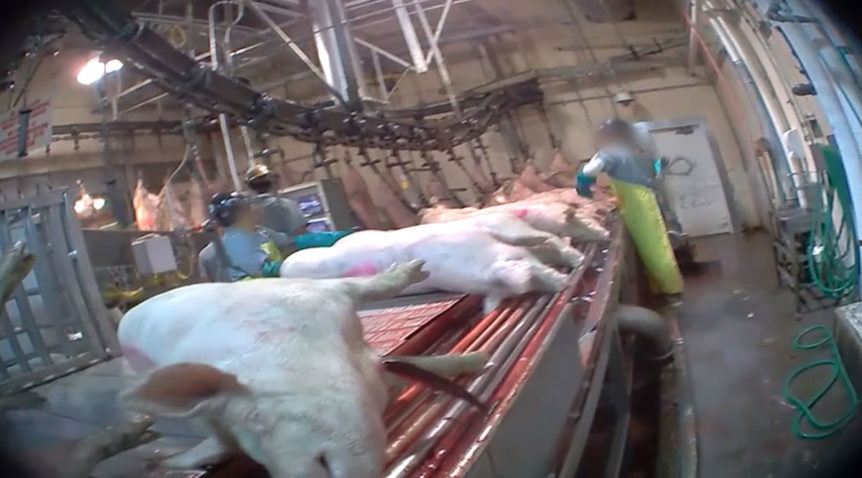In 2015, an Animal Outlook investigation revealed the horrors of high-speed pig slaughter. Our shocking footage shows animals being beaten, dragged and improperly stunned; much of the most egregious treatment was inflicted on “downer” animals who were too sick or weak to walk. Our investigator also witnessed dead pigs with pus-filled abscesses being processed for human consumption and a supervisor sleeping on the job when he should have been overseeing stunning protocol.
Now, amidst a global pandemic, the Trump administration is moving forward with a rule that largely deregulates pig slaughter operations. This rule will increase fecal contamination; allow diseased pigs, toenails, hair, and abscesses for human consumption; and increase animal abuse, according to a federal slaughterhouse inspector’s sworn statement.
The veteran USDA inspector’s statement was filed in federal court on Friday, April 10, in support of a December lawsuit brought by Animal Outlook and six other animal and environmental protection organizations* to challenge a U.S. Department of Agriculture (USDA) rule. It comes as slaughterhouses across the country shutter due to COVID-19 outbreaks, including Smithfield Foods’ Sioux Falls, South Dakota plant, which is slated to increase line speeds and reduce federal oversight under the challenged rule.
The inspector, Jill Mauer, works inside Quality Pork Processors, the large Minnesota slaughterhouse that Animal Outlook investigated, which has served as a model for the USDA’s controversial move to reduce oversight of pig slaughter nationwide.
Despite concerns from animal protection groups and consumers, the USDA recently asked the court to dismiss the challenge, arguing that the rule’s harms are speculative—even though the agency itself determined that slaughterhouses responsible for 93 percent of pigs killed for food in the United States will take advantage of the rule, and will slaughter about 11.5 million more pigs annually as a direct result.
In response, the plaintiffs fired back with a legal brief detailing why these harms are imminent. The brief was supported by Mauer’s April 10 statement, which was obtained with the help of the whistleblower advocacy organization Government Accountability Project Food Integrity Campaign.
Mauer, who has worked under both the traditional inspection system and the deregulated system, notes that under the deregulated system:
- Line speed increases consistently result in a greater number of hogs slaughtered daily and annually
- Citations for fecal contamination have increased, exacerbating food safety concerns
- Defects including toenails, hair, and abscesses are routinely allowed in meat intended for human consumption
- Diseased pigs, including those with conditions that can trigger serious health problems in humans, have been allowed for human consumption
- Pigs are forced to move faster than a normal walking speed, struck by workers, and severely overcrowded, causing them to vocalize due to extreme stress
- Pigs are often still breathing when dropped into scalding tanks as evidenced by tank water found in their lungs.
Mauer’s statement highlights many of the same conditions our investigator witnessed in 2015, indicating that profit-driven slaughterhouses cannot be trusted to self-regulate at the expense of animal welfare and consumer safety. And according to her attorney, Amanda Hitt, Mauer is the tip of the iceberg. Hitt says she’s heard from many meat inspectors echoing the same — and more — concerns about the new inspection system.
*In December, the Animal Law Litigation Clinic at Lewis & Clark Law School filed a lawsuit challenging the rule in federal district court for the Western District of New York in Rochester. The plaintiffs are Farm Sanctuary, Animal Equality, Animal Legal Defense Fund, Animal Outlook, Center for Biological Diversity, Mercy For Animals and North Carolina Farmed Animal Save. The Center for Biological Diversity and Earthrise Law Center at Lewis & Clark Law School serve as co-counsel in the case.
Our work only continues through the generosity of people like you. More than 90% of your tax-deductible donation goes directly to our lifesaving programs, legal advocacy, and undercover investigations. Please donate today: animaloutlook.org/donate.


Comments 12
Enough is enough. Wrong is wrong.
If anyone wonders why this coronavirus is upon us, its simply KARMA. The abuse all animals have endured is being handed back to humanity. It is time to stop eating all the animals you proclaim to love so much.
It is time to stop eating all animals
This is an atrocity. Those responsible, should see themselves in these abominable positions.
Terrible.
#CancelAnimalAg
This MUST end!!!!!!!!!!!!!!
That’s why I am a vegan. Enough said.
This is madness and totally on called for. These people are monsters in my opinion!! This why I don’t eat meat EVER!!!
Stop eating all animals
This horrible abuse has to end. These animals suffer their whole life in those horrible farms and then the death is another horrific thing for them to endure,
It should never have come to this point of cruelty.
Stop these cruel factory farms. people can live without meat.
STOP ALL FORMS OF ANIMAL ABUSE NOW AT TRUMPS HANDS,